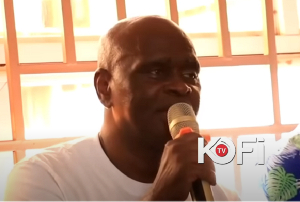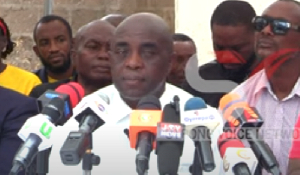Business News of Monday, 8 July 2013
Source: B&FT
Canoe fishing distressed
Canoe fishing is distressed due to low catch, high cost of equipment and irregularities in the supply of pre-mix fuel, Nii Abeo Kyerekuanda IV, Executive Secretary of the Ghana National Canoe Fishermen Council, has said.
“The industry is collapsing. In the past there were traditional regulations and norms governing artisanal or canoe fishing. We were not using unorthodox means like light, trawling, carbide, DDT etc to catch fish.
“But now people have resorted to all these means to catch fish, so the fish stocks have dwindled considerably to a very low level; and the result is that fishermen go fishing and come back with nothing. Some spend two or three days on the high seas and still come back with nothing,” the Chief Fisherman said.
About 70 percent of the total fish catch in the country is contributed by canoe fishermen, with 30 percent contributed by industrial fishing. Nii Kyerekuanda said this means if their industry collapses, “Government must fund the importation of fish into the country”.
Fishing GDP grew by 17.4 percent in 2008 and declined by 8.7 percent in 2011, before recovering to 4.7 percent growth last year.
Nii Kyerekuanda IV, who was speaking at a ceremony to introduce fibre-glass boats and canoes to fishermen by the Ghana Egypt Fibre Glass Industry at Jamestown, Accra, appealed to Government to show some interest in what is happening.
“There is need to set up a committee to look into the entire fishing industry because it is beset with so many problems.
There are areas where there are no canoes but there are pre-mix outlets. Who should buy the fuel? There are areas that require about two or three tanker deliveries but they get only one, while areas where there are no canoes get two or three trips a week,” he said.
“People are doing all sorts of things to frustrate the fishermen. Successive Governments have come and gone, but they just talk; they do not walk the talk.”
He said deep-sea fishing cannot salvage the situation, because when the fish stock is exhausted it will affect the entire spectrum -- and one may go so many miles but will not get fish.
“Pair-trawling, for instance, scoops up everything including the fingerlings and eggs; meanwhile, these fingerlings are supposed to be allowed to grow into mature fish. So if you destroy them at this stage, then there is no fish.”
Chief Executive Officer of the Ghana Egypt Fibre Glass Company, Benedict Lamptey, said fibre-glass boats have high tensile strength and many advantages over wood and plastic.
“Fibre-glass products cannot corrode, rust or rot; therefore using fibre-glass boats and canoes in the fishing business means that there will be reduced boat disasters, and fish harvests will increase for the growth of the economy.
“The fibre-glass concept for the fishing industry has begun, and application of the concept would go a long way to add value to the products and services provided by the fishing industry and other sectors of the economy.”
One advantage of fibre-glass canoes, he said, is their light weight; which means that fishermen are able to carry more fish during bumper harvests without affecting the movement of the canoe.
Speaking at the event, Deputy Minister of Trade and Industry and Member of Parliament of Odododiodio constituency, Nii Lante Vandepuije, commended the company for introducing the boats and promised support for fishermen to acquire the boats to enhance their business.
Entertainment









